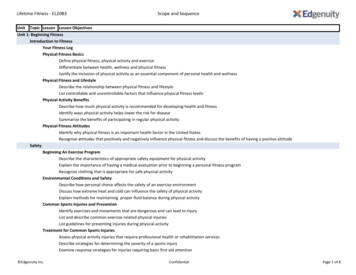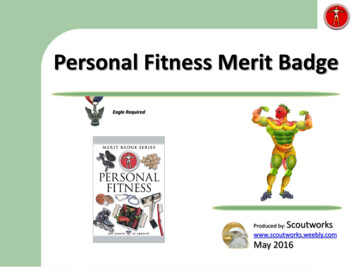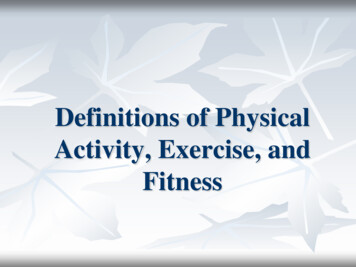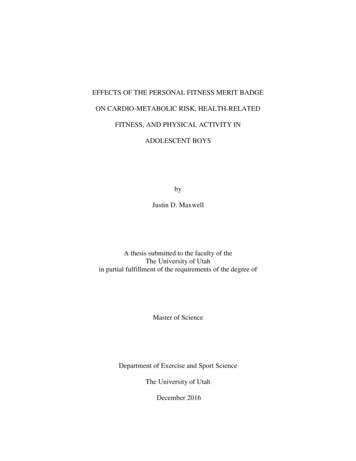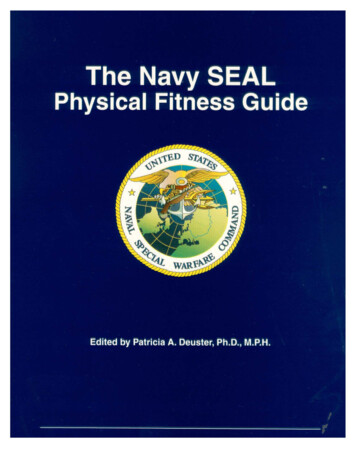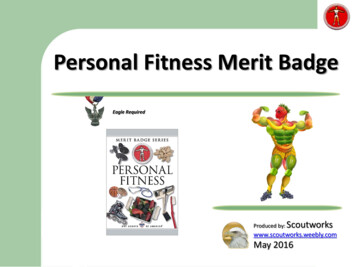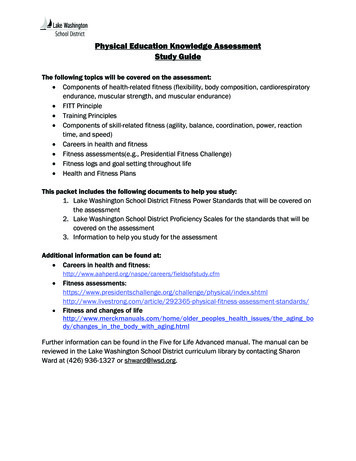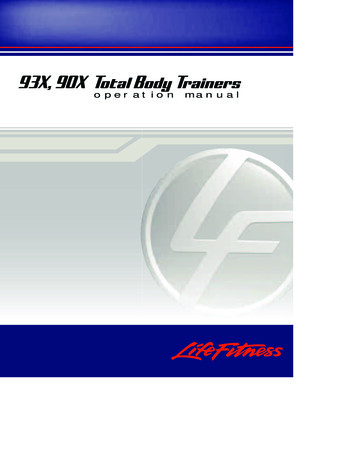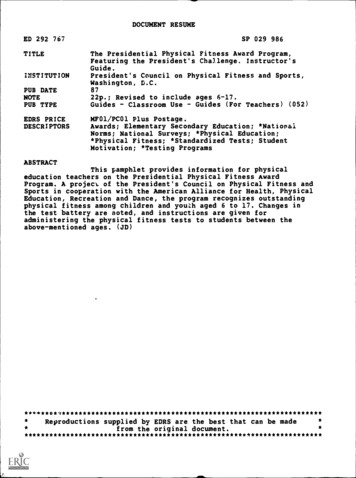
Transcription
DOCUMENT RESUMESP 029 986ED 292 767TITLEThe Presidential Physical Fitness Award Program,Featuring the President's Challenge. Instructor'sGuide.INSTITUTIONPresident's Council on Physical Fitness and Sports,Washington, D.C.PUB DATENOTEPUB TYPE87EDRS PRICEDESCRIPTORS22p.; Revised to include ages 6-17.Guides (For Teachers) (052)GuidesClassroom UseMF01/PC01 Plus Postage.Awards; Elementary Secondary Education; *NationalNorms; National Surveys; *Physical Education;*Physical Fitness; *Standardized Tests; StudentMotivation; *Testing ProgramsABSTRACTThis pamphlet provides information for physicaleducation teachers on the Presidential Physical Fitness AwardProgram. A project of the President's Council on Physical Fitness andSports in cooperation with the American Alliance for Health, PhysicalEducation, Recreation and Dance, the program recognizes outstandingphysical fitness among children and youth aged 6 to 17. Changes inthe test battery are noted, and instructions are given foradministering the physical fitness tests to students between theabove-mentioned ages. ****************************Reproductions supplied by EDRS are the best that can be made**from the original ******************************
THE PRESIDENTIALV(Instructor's GuideU 8 DEPARTMENT Of EDUCATIONOffice of Educational Research and ImprovemnlEDUCATIONAL RESOURCES INFORMATIONCENTER (ERIC)This document has been reproduced asreceived from the person or organizationoregenahngAC Minor changes have been made to improveSr'reproduction qualityPoints of view or opt mons st at ed in this docu-mem do not necessarily represent officialOERI position or pcbcyeTURING-esident's ChVISED fJ159AGenge-,
imesiOential physical fitness Awai20Malin,' 10in at annumulM m, 0111, ti at hit ,o tn, int Mon ti 111 nit Montn0In M .al ofraii00 in a tlaont. n001ontannilaltrant 10 nuton toemniNnm. ntProgram of the President's Council on Physical Fitness and Sports in cooperation %kith theAmerican Alliance for Health, Physical Education, Recreation and DancePrinted in 1987 OM 87-000163
THE WHITE HOUSEWASHINGTONJuly 16, 1986Physical education plays a vital role in today's society.Mounting medical, social, and psychological researchcontinues to support the role of physical fitness inpromoting mental and physical health, well-being,improved work capacity, and intellectual performance.It is in the physical education environment, be it atschool, in parks or recreation facilities, communitycenters, camps, and even hospitals, that childrenand youth learn this important association.The Presidential Physical Fitness Award Program isdesigned to enhance the teaching of physical fitness.With a goal in mind, young people are encouraged tochallenge their bodies to achieve a level of fitnessconsidered to be outstanding. Not all students willqualify, as is the case with any recognition program.But all students can be given the opportunity to try,and in the process improve and reach new levels offitness.This year the program has been changed, and nowyounger children will be eligible to participate. Sincelifestyle patterns are established early in childhood, Iam pleased to see thet this change has been made; andI look forward to hearing about the first boys andgirls in the new age groups to ;aceive the award.As administrators of the program, you hold the keyto its success, and to the success of the childrenand youth in your charge. Accurate and usefulinformation, taught with enthusiasm, will have apositive effect on tomorrow's adults.We are a nation in search of excellence. Promotingphysical fitness in education will help us achieve thatgoal.62.x. (?),41
1) learn how to pace themselves for that distance;2) practice covering that distance without being timed; and 3) wactice covering that distance with timing before being tested.It is also recommended that additional tests ofhealth and fitness such as body composition,blood pressure, posture checks, etc., be used tosupplement those presented in this brochure.Quality physical education programs utilize avariety of assessments and incorporate the results into meaningful and motivational lessonplans.The class curriculum should reinforce the concepts addressed in the testing program and classtime should be devoted to helping students attain a higher level of fitness. The Council recommends that all students spend 50 percent oftheir physical education time in exercises andactivities designed to improve their cardiorespiratory endurance, muscle strength and endurance, flexibility and body composition. In theremaining time, a variety of activities includingsport skill and instruction should be provided toimprove speed, agility, balance, power and coordination.The following suggestions facilitate the involvement of ALL students:1) Group students according to ability level asgauged by fitness testinginterested studentsshould be grouped together and special techniques should be used to motivate those whoare not;2) Offer electives so students can select activities they enjoy;3) Introduce new and unique choices to thecurriculum;4) Continually provide feedback to students ontheir progress; and5) Develop lesson plans to ensure that everychild is active during class; for example, adjustfield/team sizes and provide enough equipmentto give every student an opportunity to participate rather than spend excessive time waitingfor a turn.4tlAltMMILA
Starting with the 1986-87 school year, thePresidential Physical Fitness Award Program(PPFA) takes on new dimensions. Based on theresults of the 1985 School Population FitnessSurvey funded by the President's Council onPhysical Fitness and Sports (PCPFS) and conducted by the Institute for Social Research atthe University of Michigan, the program includes five test items for boys and girls andnorms for ages 6-17.The New andRevisedPresidentialPhysical FitnessAward ProgramThis is the first time in the 20-year history ofthe program that Presidential recognition willbe awarded to youngsters ages 6-9.Established in March, 1966, the PPFA programhonors boys and girls who demoustrate exceptional physical achievement. It is designed to:(1) motivate boys and girls to develop andmaintain a high level of physical fitness; (2) encourage good testing programs in schools andcommunities; (3) stimulate improvement ofhealth and physical education programs; and(4) provide additional information on the physical condition of America's youth.The program was conceived by the PCPFS andprogram details were developed jointly withthe American Alliance for Health, Physical Education, Recreation and Dance. The program isadministered by these two organizations.TEST BATTERY CHANGESThe new test battery now measures lower hack/hamstring flexibility in addition to cardiorespiratory endurance, upper body, arm and abdominal muscle strength and endurance, andleg muscle, endurance and power combinedwith speed and agility. The revised test includes, for boys and girls:one-mile run/walkV-sit reach (Option: sit and reach)curl-upsshuttle runpull-ups#.5## AigtkAtitf 5Vb
Omitted from the new program are the 600yard walk/run, the 50-yard dash, the standinglong jump and flexed-arm hang. The totalnumber of test items for each individual hasbeen reduced from six to five.The 1986 changes were made to assess the maincomponents of fitness for performance andhealth and to focus on some of the physicalweaknesses of youngsters as revealed by the1985 School Fitness Survey.Students still must score at or above the 85thpercentle on all five items to qualify for theaward. There is no limit on the number of triesstudents may have on each test item.FitnessComponentsMeasured in thePresidentialPhysical FitnessAward Program6BRAIMITAnt%7
k-:I141041 1t\RMitfS7
Instructions forthe PresidentialPhysical FitnessAward TestCURL-UPS (Boys and Girls)OBJECTIVENumber of curl-ups performedin one minute.EQUIPMENTStopwatch. A mat or otherclean surface is preferred.STARTING POSITION Student lies on backwith knees flexed at 90 degrees; partner holdsfeet. Heels should not be more than 12 inchesfrom the buttocks and the back flat on thefloor. Arms are crossed with hands placed onopposite shoulders, arms close to chest. Thearms are held in contact with the chest at alltimes.ACTIONStudent raises the trunk curling upto touch elbows to thighs and then lowers theback to the floor so that the scapulas (upperback) touch the floor. This constitutes one curlup.THE TESTThe timer calls out the signal"GO" and begins timing one minute. Studentstops on the word "stop." The number of correctly executed curl-ups completed in 60 seconds is the student's score.RULES1. "Bouncing" off the floor/mat is not allowed.2. The curl-up will be counted only if thestudent (a) keeps fingers touching shoulders;(b) touches elbows to thighs; and (c) returns to position with scapula touchingfloor beforecurling upagain.IVAIDAMM
PULL-UPS (Boys and Girls)OBJECTIVEMaximum number of pull-upscompleted (no time limit).EQUIPMENTA horizontal bar at a heightthe student can hang from with arms fully extended and feet free from floor.STARTING POSITION Student assumeshanging position on bar with overhand grasp(palms facing away from body).Small students may be lifted tostarting position.ACTIONStudent raisesbody until chin is overthe bar without touchingit and then lowers bodyto the full-hang startingposition.THE TESTStudent performs as many completedpull-ups as possible.RULES1. The body must not swing during the movement. If the student's body starts to swing, holdan extended arm across the frontof the thighs.2. The pull-up must be smoothand not a snapping or jerky movement. Kicking of the legs or bending the knees is not permitted.Wif#11701041itf 910
V-SIT REACH * (Boys and Girls)OBJECTIVEFarthest distance reached pastbaseline.EQUIPMENTClean floor, yardstick, adhesive tape.SET-UPA straight line two feet long is markedon floor. This is the baseline. A line is drawnperpendicular to the midpoint of the baselineextending two feet on each side. This is themeasuring line. Place one-inch and half-inchmarks along the measuring line on each side ofthe baseline or lay a ruler down to measuredistance reached. The "0" point is where thebaseline and measuring lines intersect.STARTING POSITIONStudent removesshr-s and sits on floor with measuring line between legs and soles of the feet placed immediately behind the baseline. The heels should be8-12 inches apart.ACTIONStudent clasps thumbs so that handsare together, palms down and places them onfloor between legs. While the legs are held flaton the floor by a partner, subject holds soles offeet perpendicular to the floor (feet flexed) andslowly reaches forward along the measuringline as far as possible, keeping the f;ngers incontact with the floor. Three practices tries aregiven. On the fourth extension, student holdsfarthest reach for a count of 3 seconds whilethat distance is recorded.' OPTION: SIT AND REACH, page 12.10tnkkRAAIMV,Ik11
RULES1. Legs must remain straight, soles of feetperpendicular to floor.2. Students should not "bounce."3. Mark scores at point where fingertips touchfloor.4. Scores are recorded as plus scores for reachesbeyond baseline and minus scores behindbaseline. All scores are recorded to the nearest half-inch.IMMIIIAPtftNitf1z11
SIT-AND-REACH (Boys and Girls)OBJECTIVEFarthest distance reached.EQUIPMENTSpecially constructed box witha measuring scale marked in centimeters; 23 cm.at the level of the feet.STARTING POSITIONStudent removes shoesand sits on floor .t the measuring box withknees fully extended and feet shoulder-widthapart. The soles of the feet should be flat againstthe end of the box.ACTIONStudent extends arms forward placing hands on top of each other along measuringline, palms down. The test administrator holdsthe student's knees with one hand to keep kneesextended. Student reaches forward along themeasuring line as far as possible. Three practicetries are given. On the fourth extension, studentholds the position of maximum reach for onesecond while that distance is recorded.RULES1. Legs must remain straight, soles of feetagainst box.2. Fingertips of both hands should reachevenly along measuring line.3. Scores are recorded to the nearest centimeter.QUALIFYING STANDARDS (in centimeters)Age6789 10 11 12 13 14 15 16 17Boys31 30 31 31 30 31 31 33 36 37 38 41Girls32 32 33 33 33 34 36 38 40 43 42 42Details regarding this test Item are taken from theAAHPERD Health Related Physical Fitness Test ManualItiM111011Millv
ONE-MILE RUN/WALK (Boys and Girls)OBJECTIVEFastest time in minutes and seconds to cover one-mile distance.EQUIPMENTTrack or safe area marked toequal distance of one mile. Stopwatch.STARTING POSITIONStudent assumes standing "ready" position at the start of course. Morethan one student at a time can be tested if areapermits and an adequate timing and recordingsystem is used.ACTIONAt the signal "Ready? Go", thestudent begins running the miledistance. Fast times are encouraged, however, walkingmay be interspersed with running.RULESWalking is permitted, but students should beencouraged to cover the distance in the shortest timepossible.Before administering thistest, student's healthstatus should be reviewed.Also, students should begiven ample instruction on howto pace and allowed to practicerunning this distance againsttime.AffiffORMIONii1413
SHUTTLE RUN (Boys and Girls)OBJECTIVEFastest time to perform run.EQUIPMENTTwo blocks (i.e. wood, erasers)approximately size 2" x 2" x 4", stopwatch,two parallel lines 30 feet apart.STARTING POSITION Two parallel lines aremarked on the floor 30 feet apart. The width of aregulation volleyball court is a suitable area. Theblocks of wood are placed behind one of the lines.Student starts from behind the other line.ACTIONOn the signal "Ready? Go" the studentruns to the blocks, picks one up, runs back to thestarting line, places block behindline, runs back and picks upsecond block and runs backacross starting line.RULES1. Record score to the nearesttenth of a second.2. Do not allow student tothrow blocks across line.HINTSIf the scorer has two stopwatches or one with a split-secondtimer, it is preferable to have twopupils running at the same time.To eliminate the necessity ofreturning the blocks after eachrace, start the races alternately,first from behind one line and thenfrom behind the other.14NRAV-111MPA
Students who qualify for the PresidentialPhysical Fitness Award receive an official certificate signed by the President of the UnitedStates. The 8" x 10" certificate is suitable forframing and includes a Presidential signature,Presidential emblem and a brief congratulatorymessage. There is room for the student's nameand school to be inscribed.In addition, students who qualify receive anaward emblem designed for wear on sweaters,jackets or sweatsuits. The award emblem isthree inches in diameter and is embroidered inAward Materialsgold, red, white and blue. It features a numberindicating the number of years the recipienthas won the Presidential Physical FitnessAward. Only one award can be earned in eachschool year. Presidential award decals in thesame design as the emblem are also available tobe used on textbooks, notebooks, luggage andbulletin boards.Order forms for the materials' are availablefrom the Council office. However, all materialsare ordered from the American Alliance forHealth, Physical Education, Recreation andDance (AAHPERD) office, 1900 AssociationDrive, Reston, VA, 22091.Award winners shouldnot be asked to paythe fee charged forthe awards. It issuggested thatfinancial helpbe soughtfromsources suchas localPTAs, serviceclubs, businesses andveterans groups ifnecessary.itfigtlfigattitf161,
InstructorRecognitionA Presidential Instructor Emblem is available to teachers and other instructors whoqualify young peoplefor the award. Theemblem is fourinches in diameter andembroideredin gold, red,white andblue.4Motivation:CentralFocus of PPFAProgramThe Presidential Physical Fitness AwardProgram can help emphasize the physical fitness objectives of physical education by providing a means of evaluation and motivation. Thisaward and other awards such as those offeredby AAHPERD recognize students at variouslevels of fitness and ability.The PCPFS recommends that testing be carriedou at least twice a year and that the year'scurriculum be designed to teach and reinforcethe basic components of physical fitness. Thecurriculum also should address those weaknesses shown by students in early testing andprovide special instruction to the physicallyunderdeveloped and handicapped.It is suggested that annual awards dinners, traditional honor assemblies or special demonstration programs for parents and other guests beused to highlight the accomplishments of thosestudents in the awards program. This is also agood time to recognize out-of-school awardsponsors. At these occasions, Presidentialawards can be presented and student accomplishments in fitness noted. An individual boyor girl, however, is eligible for only onePresidential Award during any one school year.titl,MTAWA
SCHOOL DEMONSTRATION CENTERPROGRAM: Each State has been allotted a specific number of schools that it can select to serveas demonstration centers for the PCPFS. Theseschools represent the highest quality physical education programs in the Nation. Criteria for theselection of these centers is developed by theState Department of Education and approvedby the Council. Each school that is selected receives a certificate and pennant from the Council and a letter of congratulations from theChairman of the PCPFS.SpecialMotivationalAspects of thePresidentialPhysical FitnessAward ProgramSchools that serve as a demonstration center fora period of three consecutive years are eligibleto receive honor roll status. These demonstration schools are listed at the Council headquarters and used for referrals to anyone wishing toobserve outstanding programs of physical education.For information on applying as a State demonstration school contact your State's director ofphysical education at the Department of Education or the PCPFS.STATE CHAMPION PROGRAM: Established in 1972, the State Champion Programrecognizes outstanding school achievementin physical fitness. The State ChampionAward is presented annually to threeschools in each State. It goes to theschools that qualify the highest percentage of eligible students for thePresidential Physical Fitness Awardin each of three enrollment categories: fewer than 100 students; 101500 students; more than 500 students. Each winning school receivesa certificate. Every student whoearns the Presidential Physical Fitness Award and helps the school become a State Champion receives aspecial embroidered State Championemblem.AWATNARIaitfIIs17
Highlights ofthe 1985School FitnessSurveyThe 1985 School Fitness Survey was designed to: (1) assess the physical fitness status ofAmerican public school children ages 6-17; (2)establish national norms for these age groupsby age and sex; (3) compare these data withthe results of similar surveys completed in1958, 1965, and 075.A four stage probability sample was designed toselect 19,200boys and girls from approximately57 school districts and 187 schools. The desiredyield was 500 boys and 500 girls per grade oneach test. The sample yielded a total pool of18,857 students9,678 boys and 9,179 girls.The survey included the following test items:curl-ups, one-mile run, 600-yard dash, shuttlerun, standing long jump, sit-and-reach test,pull-ups, flexed-arm hang and two-mile walk.All data were analyzed and comparisons madewith previous surveys where applicable. Boysand girls ages 6-17 were tested on all items.In general, the performance of 1985 youth wasnot much different from that of youth in 1975.There was poor performance by large numbersof boys and girls on tests of arm and shouldermuscle strength and endurance, abdominalstrength and endurance and flexibility. Overall,boys scored higher than girls except on the flexibility test. Girls declined or stayed at the samelevel in their performance after age 14.Some specific findings:In the V-Sit Reach flexibility test, 40percent of boys age-, 6-15 could not reach beyond their toes;Approximately 50 percent of girls ages6-17 and 30 percent of boys ages 6-12 could notrun a mile in less than 10 minutes;One out of four boys ages 6-12 could notdo one pull-up;55 percent of all girls tested could nothold their chin over a raised bar for more than10 seconds.18MID-MnikA
Fitness testing of youth served as the impetus for the formation of the Council in 1956.Hans Kraus, a well-known physician in NewYork City, published the results of a studyshowing that American boys and girls werewoefully unfit as compared to the children ofWestern Europe. The study received widespread publicity and "shocked" the nationalconscience. A concerned President Dwight D.Eisenhower quickly founded the President'sCouncil on Youth Fitness as part of a nationalcampaign to help get America's younger generation in shape. This early effort accountedfor an increased emphasis on the physical fitness objectives in physical education.Similar surveys were conducted in 1965 and1975 using the American Alliance for Health,Physical Education, Recreation and Dance(AAHPERD) Youth Fitness Test. In general,scores improved on most test items from 1958to 1965 but have remained the same since then.In 1966, President Lyndon B. Johnson launchedHistoricalPerspective ofPCPFS Role inYouth FitnessTestingthe Presidential Physical Fitness Award Programencouraging American youngsters to "Join thePresident's 411-American Team." The norms usedin the program, which recognizes exceptionalphysical f.zness achievement, have been based onthe results of each decade's survey.WATittftWitf9.19
CURL-UPS(Arms across chest)AGE(Timed one minute)SHUTTLERUN(seconds)V-SIT REACHOR SIT AND REACH(inches / )ONE-MILE 111(minutes/seconds)Scores based on 198.5 School Population Fitness SungSee page 12 for SIT AND REACH scores.APULL-UPS
DEPARTMENT OFHEALTH & HUMAN SERVICESThe President's Council onPhysical Fitness and SportsWashington DC 20001)Postage and Fees PaidU.S. Dept. of H.H.S.HHS 396Official BusinessPenalty For Private Use 300LFIRST CLASS-------il.00LiNI
The Presidential Physical Fitness Award Program is designed to enhance the teaching of physical fitness. With a goal in mind, young people are encouraged to challenge their bodies to achieve a level of fitness considered to be outstanding. Not all students will qualify, as is the case with any recognition program.


